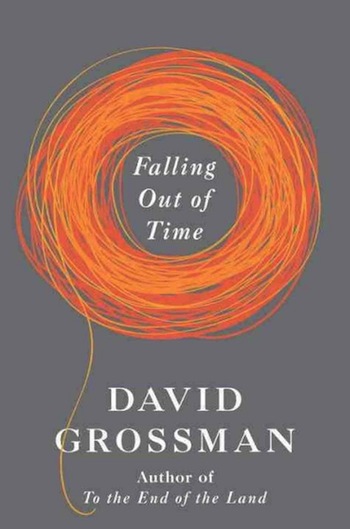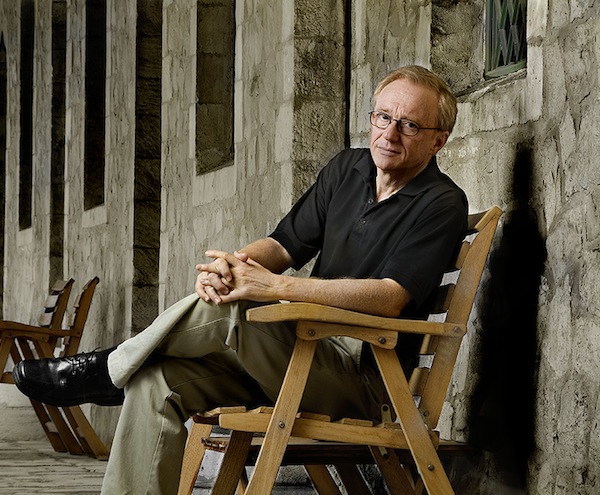Book Review: David Grossman’s “Falling Out of Time” — It Takes A Village
“Falling Out of Time” is a book that gives all the truth that Israeli writer David Grossman can deliver, and far more intimacy than we strangers who are his readers have earned.
Falling Out of Time by David Grossman, translated from the Hebrew by Jessica Cohen, Knopf, 208 pages, $24.95.
By Debra Cash
This is a book that makes a reader avert her eyes, and a book that time may prove to be an indispensible classic.
As all the world, and certainly every Hebrew reader in Israel knows, novelist David Grossman lost Uri, the youngest of his three children, when his tank took rocket fire during the second Lebanon war in August, 2006. Grossman had been working on his big, ambitious To the End of the Land for three years when his son was killed — they had conferred on plot points — about a woman’s frantic walkabout spurred by the magic thinking that if military authorities did not find her at home, they would never be able to inform her that her son had been killed while on duty.
Although Grossman later said that writing that book had been his quasi-talismanic effort to protect Uri’s older brother during his mandatory national service, by the time of To the End of the Land‘s publication the volume had been reedited and recast as prescient. (Arts Fuse review of To the End of the Land) Given his visibility as a leading Israeli voice for peace and mutual reconciliation with the Palestinians, the tragedy had a particular dissonance. The great peacenik’s son had been killed in a war led by a government he had denounced — and for a country he loves.
Falling Out of Time is a slim volume in free verse. Rather than a fully-informed novel, it is a fable or perhaps an oratorio (some reviewers have suggested it might be a script for a radio drama). Given that Grossman’s prose has been rendered with the same sinewy voice by To the End of the Land‘s Israeli-American translator Jessica Cohen, the book eases naturally into the role of sequel or epilogue.
In this 21st century Book of Job, a couple’s son has died. Five years into his grief, the hapless father suddenly rises from the dinner table and announces that he will circle his small world to find his son again, to stir up and be burned again by the embers of a memory that despite all his efforts — and to his horror — is fading.
I share the vast expanse his death
created in me —
and he surges
and he wanes with me
This father, known only as Walking Man, interacts with a village of archetypes. Each character has lost a child at some time in the past: daughters, sons, some as babies, some as young men and women. The survivors — if we can call them that — fall into a bitter, ad hoc processional, wailing in a register that can only be discerned by members of their fellowship of bereavement. The refrain of this Greek chorus is it can’t be, it can’t be. Together they enact a terrible collective ritual.
Yet at the same time as the Walking Man is journeying outward to a community of loss, Falling Out of Time plays out as literary gestalt therapy with the novelist as patient. He is the Woman who has lost her son, simultaneously hoping to give comfort and to flee her nightmare. He is the Town Chronicler, a man with his notebook filled with an omniscient narrative penned in the service of a powerful Duke who insists on his collecting all the details. He is a stuttering midwife who keeps count of the birthdays her lost baby will never celebrate, an elderly math teacher who applies Spinoza’s axioms to mortality’s subtractions, and a net mender who hides in the darkness. Most startlingly, he is an excoriating, profane centaur, half writer, half desk.
In short, by way of almost breathless verse lines and extended arias, stories of each character’s loss interpenetrate among the various conversations, each loss an outrage as if it would take a literal village to represent and manage their myriad shades of grief.
Absence becomes the organizing principle of the Walking Man’s efforts, the yawning center of a spiral of stalled time that he has begun to believe he will never overcome. As the Duke says — and the reference to the month when Uri Grossman died cannot be coincidental:
In August he died, and when that month was over, I wondered
How can I move
to September
While he remains
in August?
It is a relief, then, to tear off any scar, to feel connected to the lost beloved. It is better than being what the Town Chronicler calls a “memory-amputee.” And as the centaur notes, it is writing that fights
against that which diminishes,
which decimates
and dulls.
As early as his first, uneven, and undeniably great 1989 novel See Under: Love, Grossman demonstrated a torch-like ability to illuminate details about childhood and parenting children. His descriptions here are lush and poignant:
Oh, he had smells for every season:
the earthy aromas of autumn hikes,
rain evaporating from wool sweaters,
and when you worked the spring fields together,
odor from the sweat of your brows,
the vapors of working men, filled the house —
Grossman gives most of these Adamic memories to the grieving mother, but I can’t think of another contemporary male author working in any language who cherishes them more.
Midway through Falling Out of Time, the centaur challenges the Town Chronicler with words that reflect the bruises of a celebrity whose private tragedy became a subject for voyeurism:
Isn’t it incredibly fortunate that you, as part of your job…can spend as much time as you want peering into other people’s hells, without dipping so much as your pale little pinkie inside them?…I’d better quickly put on an expression of tender sorrow and commiseration, and in a flash I’ll dip my silver-plated quill in its black ink, and one-two-three, I’ll ask about the son, ask about the son, ask about the son! And if the subject’s answers are not satisfactory, I won’t give up…
I’ve never interviewed Grossman — and hope I would never have been so tone deaf, so presumptuous in his presence — but admittedly, in my sifting through the clues in the initial reports of the tragedy, during his dignified presence in Boston last year and in even my eagerness to review this book within weeks of its English-language publication date, I am surely guilty as charged.
Falling Out of Time is a book that gives all the truth David Grossman can deliver, and far more intimacy than we strangers who are his readers have earned. I can only hope it brings him comfort among the mourners in Zion and everywhere.
Debra Cash has reported, taught and lectured on dance, performing arts, design and cultural policy for print, broadcast and internet media. She regularly presents pre-concert talks, writes program notes and moderates events sponsored by World Music/CRASHarts and cultural venues throughout New England. A former Boston Globe and WBUR dance critic, she is a two-time winner of the Creative Arts Award for poetry from the Hadassah-Brandeis Institute and will return to the 2014 Bates Dance Festival as Scholar in Residence.
c 2014 Debra Cash
Tagged: David-Grossman, Falling Out of Time, Israeli literature


